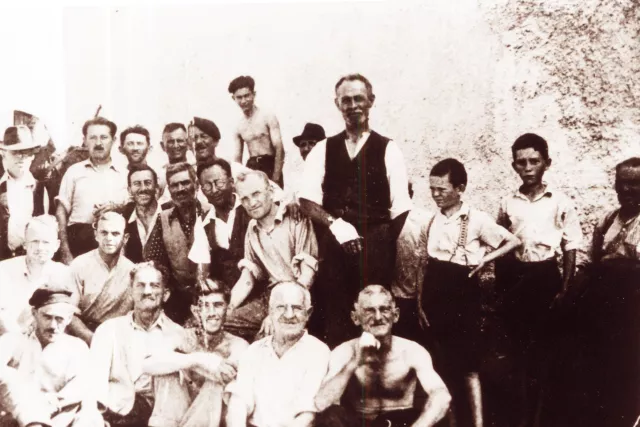The photo was taken in Bucharest, in the five-week camp in the Aparatorii Patriei quarter, in the summer of 1941. The boy on the right, wearing suspenders, is my younger brother, Osias. Next to him, the other boy, is our first degree cousin, Zvi Froim. Up in the middle, without a shirt, is another cousin, Zvi's brother, David Froim.
Osias Leinweber, my younger brother, was born on 1st March 1932 in Bucharest. He chose the way of playing in bands - he had an ear for percussion instruments. He played at a restaurant in Ferentari, and then at the 'Dunarea' [restaurant], and the 'Pescarus' [restaurant]. He also played at the dining terrace in Herastrau Park [the 'Monte Carlo' restaurant], until he was hired by the 'Ion Vasilescu' theater company. He went on tours to Israel, Russia, and Poland, and then he came back and played for the 'Savoy' [Theater]. Without letting us know, he submitted his emigration papers and left to Israel [in the 1970's]. He didn't spend much time there. He went to Germany, where he worked for a while, and where he has been living with his wife for 30 years.
Zvi Froim left for Israel in when he was a child. He became a molding worker and a mechanic - he had his own workshop in Ashkelon and he employed a staff of two. In 1974, he came looking for me. He died, but left behind him a boy, Iair, who's specialized in electronics.
David Froim , my cousin, learnt the tailor's trade from his father, of whom he didn't lost sight. He did his military service in Israel, where he fought in the first war for independence, and he told us they had a gun - which was as old as the hills anyway - for five or six people. After the war, he worked as a warehouse manager for the phone company in Haifa until he retired. He had three children: two boys and a girl.
In June 1941, after the outbreak of the anti-Soviet war, Bucharest was bombed by the Russian Air Force. The bombs hit Justitiei St., located close to 11 Iunie St., right at the foot of the Metropolitan Cathedral's Hill, a house in our neighborhood [at the outskirts of the city] and a wing of the Hospital no.9 for mental illnesses. I don't know whether there were any rumors or suspicions concerning the Jews. What's certain is that, on 22nd July 1941 [Ed. note: in observance of Order no.4599/1941 of the Internal Affairs Ministry], all the Jews in the neighborhood were gathered [by the gendarmes]. All the [male] Jews from 18 years old to the oldest age were herded inside our synagogue and in its courtyard and forced to stay there. In two or three days our group was enlarged with some other men from Giurgiului Dr., the Progresul [quarter], Pieptanari Dr., Colentina Dr., the Bucurestii Noi and the Traian quarters, and Oltenitei Dr. We were more than 60 people and we were detained there for five weeks, guarded by the gendarmes. Only family members were granted access to us. No one from the Community or the Jewish Central Organization showed any interest in our fate. I saw hunger with my own eyes, in those whose wives or mothers had nothing else to bring from home. I remember the moments when one shared with his neighbor or friend what he had got from home, and the moments when one had to hide from the others in order to secretly eat something. However, our situation got better thanks to a former [Jewish] tenant from our neighborhood named Ascher, who managed to provide us food every day at his own expense. When the late Asher, may God rest his remains and his soul, brought us the necessary food, our morale went up, humiliations disappeared, and we simply lived there under the gendarmes' watch. As I am probably the last inmate alive, I try to remember the names and occupations of those people in the camp [Ed. note: When using the term 'camp', Mr. Leinweber refers to the enclosure where the Jews were forced to live under military surveillance and which they were not allowed to leave, not a concentration/extermination camp proper], and various situations of that time.
After 5 weeks, at the end of August, an official decision [Ed. note: Order no.31200/1941 of the Joint Chiefs of Staff] freed us from the camp and put us under the authority of the Drafting Center, which sent us to various detachments; it was the beginning of the forced labor.
Osias Leinweber with Zvi and David Froim
Share
Photos from this interviewee
The Centropa Collection at USHMM
The Centropa archive has been acquired by the United States Holocaust Memorial Museum in Washington, DC.
USHMM will soon offer a Special Collections page for Centropa.
Academics please note: USHMM can provide you with original language word-for-word transcripts and high resolution photographs. All publications should be credited: "From the Centropa Collection at the United States Memorial Museum in Washington, DC". Please contact collection [at] centropa.org.





























